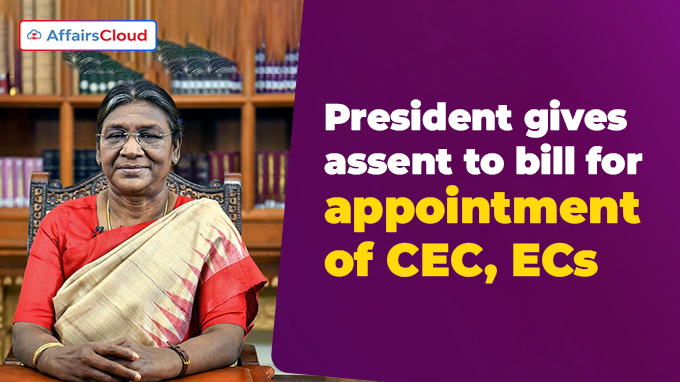 President of India Droupadi Murmu gave assent to two bills including The Chief Election Commissioner and Other Election Commissioners (Appointment, Conditions of Service and Term of Office) Bill, 2023, and The Press and Registration of Periodicals (PRP) Bill, 2023
President of India Droupadi Murmu gave assent to two bills including The Chief Election Commissioner and Other Election Commissioners (Appointment, Conditions of Service and Term of Office) Bill, 2023, and The Press and Registration of Periodicals (PRP) Bill, 2023
- As per the Indian constitution, a bill transforms into an act upon receiving the president’s assent and is formally announced in the official gazette. Consequently, the aforementioned bills have now been enacted as acts.
The Chief Election Commissioner and Other Election Commissioners (Appointment, Conditions of Service and Term of Office) Bill, 2023
The key purpose of the bill is to put in place a mechanism for the appointment of the Chief Election Commissioner (CEC) and other Election Commissioners (ECs).
- The Bill replaces the Election Commission (Conditions of Service of Election Commissioners and Transaction of Business) Act, 1991
Key features of the bill
This legislation is aimed to bring transparency in the appointment process of CEC and other EC.
- The new legislation covers aspects such as appointment, Salary, and removal of CEC and other EC.
i.Appointment: The president would appoint the CEC and ECs based on the recommendation of a selection committee, comprising the prime minister, a union cabinet minister, and the leader of the opposition or the leader of the largest opposition party in the Lok Sabha.
- The CEC and other EC shall hold office for a term of 6 years from the date on which he assumes his office or till he attains the age of sixty-five years, whichever is earlier.
- Recommendations of the Selection Committee will be valid even when there is a vacancy in this Committee.
- Earlier the selection committee consists of the prime minister, the Chief Justice of India (CJI), and the leader of the opposition since the order of the Supreme Court on March 3, 2023.
- Before the order, the appointments were made by the President on the recommendation of the central government
Note – The Bill passed by the President has dropped the Chief Justice of India from the selection committee.
ii.Search Committee: The bill also has provisions regarding the establishment of a Search Committee to prepare a panel of five persons for consideration for the positions of CEC and ECs
- The Search Committee will be headed by the Minister of Law and Justice and will also include two members not below the rank of Secretary who have knowledge and experience in matters related to elections.
iii.Salary: The salary and conditions of service of the CEC and ECs will be equivalent to the supreme court judge.
iv.Resignation and removal: The Bill retains the manner of removal of CEC and ECs as specified in the Constitution.
- The CEC may be removed in the same manner and on the same grounds as a Supreme Court Judge. ECs may be removed only upon the recommendation of the CEC.
Background
The Supreme Court (SC) in March 2023 ruled that CEC and ECs will be appointed by the President of India on the advice of a committee consisting of the Prime Minister, and Leader of Opposition in the Lok Sabha, and the Chief Justice of India until a law is enacted by Parliament on their appointments since no parliamentary law was enacted as prescribed by Article 324 of the Constitution.
Press and Registration of Periodicals Bill, 2023
The Press and Registration of Periodicals Bill, 2023 replaces the Press and Registration of Books Act, 1867
- The Ministry of Information and Broadcasting is the concerned ministry Highlights of Bill
i.The bill aims to modernize and simplify the registration and declaration process. It will help publishers in easing up the procedures and reducing the number of declarations and fillings.
- The application for title verification and grant of certificate of registration by the Press Registrar General to a periodical has to be done simultaneously to complete the process in time time-bound manner.
- The specified authorities are required to provide feedback within 60 days.
- The Bill provides for the minimalistic role of the District Magistrate/local authority in granting of Certificate of Registration and title allotment.
ii.The bill prevents individuals convicted of terrorism or acting against state security from publishing periodicals.
iii.Comparision with the 1867 Act
- The bill replaces imprisonment with fines for certain violation
- An appellate mechanism led by the Press Council of India has been introduced.
- The administrative power has been shifted from the District Magistrate to the newly established Press Registrar General.
About Ministry of Information and Broadcasting
Union Minister: Anurag Singh Thakur(Lok Sabha- Hamirpur, Himachal Pradesh)
Minister of State: Dr. L. Murugan (Rajya Sabha – Madhya Pradesh)




